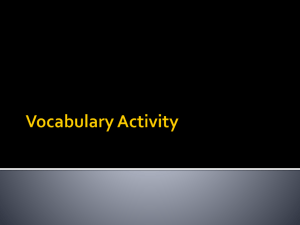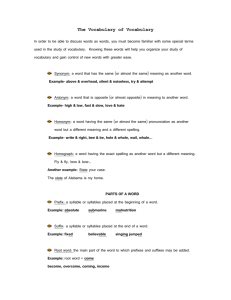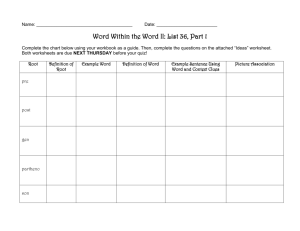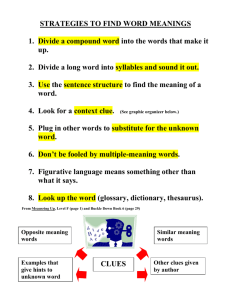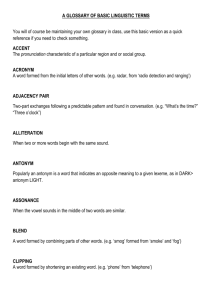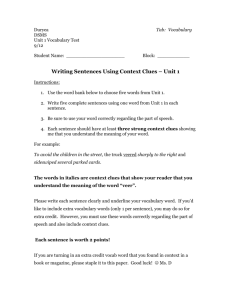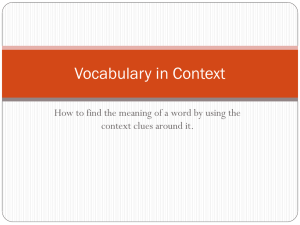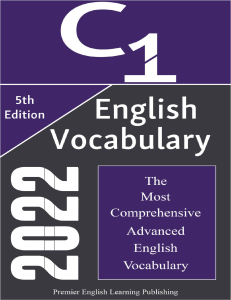Vocabulary from Context
advertisement
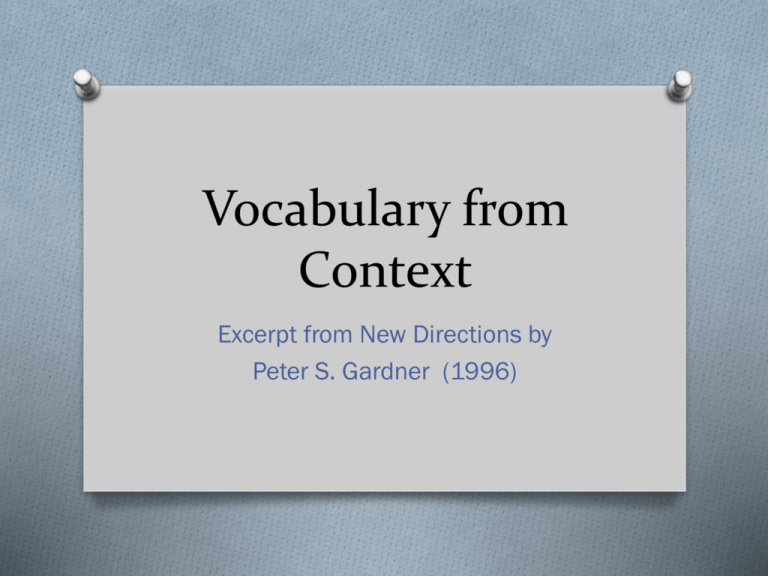
Vocabulary from Context Excerpt from New Directions by Peter S. Gardner (1996) The “What” and “Why’s” of Using Context Clues O context O O O O the sentence and paragraph in which the word appears using context clues allows the reader to make an educated guess +++ can avoid interruption which can interfere with reading comprehension +++ helps the learner retain meaning from the reading because they are asking questions of themselves +++ requires making connections between sentences—inferring, an important skill Example: The average age at which babies begin walking is about 12 months, while 11 months is the average age for cruising. What is cruising? trying to walk while holding on Four Types of Context Clues O Words with a similar meaning O Words used in contrast O Definitions, direct or indirect O General context Words with a Similar Meaning Example: Tuesday is always the worst day—it’s the day the drudgery, boredom, and fatigue start all over again.” (from “Confessions of a Working Stiff”) What are the synonyms or related words near by? boredom and fatigue Another Example At the age of five, six, well past the time when most other children no longer easily notice the difference between sounds uttered at home and words spoken in public, I had a different experience.” (from Hunger of Memory) What is the nearby synonym? spoken Phrases that Signal Similarity O Likewise O Similarly O By the same token O In the same way Example “Birdwhistell maintains that verbal communication represents less than 35% of the ‘social meaning’ of a situation, while more than 65% is expressed through nonnverbal communication. Similarly, Albert Mehrabian contends that the total impact of a message is composed of a 7% verbal element, a 38% vocal element, and a 55% facial element.” (from “Cultural Differences in Nonverbal Communication”) Are the underlined words synonyms, antonyms or? Do you know what either maintains or contends means? says, argues Words Used in Contrast Look for words (near by) opposite in meaning to the one you don’t know. Example: The child comes to school curious about other people, particularly other children, and the school teaches him to be indifferent.” (from “School is Bad for Children”) What is the antonym? curious Look for: not Example: Generalizing about groups of people makes many of us nervous. We like to think of ourselves as unique individuals, not representatives of stereotypes.” (from “Sex, Sighs, and Conversation) What does stereotypes mean? Look Contrast Words and Phases O but O however O although O on the other hand O on the contrary O in contrast O nevertheless O whereas O despite Examples with Contrast Words Barbara Gutek surveyed 1,200 men and women for a study on harassment. She asked her subjects whether they considered a sexual proposition flattering. About 67% of the men said they would, while only 17% of the women agreed. In contrast, 63% of women would be insulted by a proposition, compared with just 15% of men. (from “Striking a Nerve”) What is the antonym of flattering? insulted by Look for Adverbs with a Negative Meaning O rarely O never O only Example: “The jejune assignments that teachers give rarely lead to inspired student essays.” What is the antonym of jejune? inspired What does jejune mean? boring Look for Words with Negative Prefixes un, in, im, il, ir, non, a, dis Example: Sotopo thrust out his hand to grasp Adrian by the hand, but the Dutch boy was frightened by the unexpected movement and drew away. What did Sotopo do with his hand? He pushed it out quickly, unexpectedly. Look for Direct Definitions Example: “Each of us speaks a distinctive form of English which is not identical in every particular with the form spoken by anyone else; linguists call this individual variety of language an idiolect.” (from “The English Language in the Dictionary”) The definition is right there!! Commas, Parentheses or Dashes Example: Commas “Alzheimer’s disease, a progressive form of degenerative brain disease of unknown cause, affects an estimated 2 to 4 percent of people over 65.” (from Human Sexuality) Example: Parentheses “The disposition towards ethnocentrism (centeredness on one’s own group)might well be the characteristic that most directly relates to intercultural communication.” (from Communication Between Cultures) Example: Dashes “Because the Incas preserved their mummies, it seems that they never felt the urge to represent their ancestors as gods in their art. Thus, the huacas—the mummies or the stones representing them— were not dedicated to particular gods.” (from World Religions) Indirect Definitions: such as examples Example: “While the material aspects of African cultures—technology of iron-working, wood carving and weaving—died out or were greatly transformed, nonmaterial aspects survived.” (From Comprehensive Multicultural Education) How can we figure out what material aspects means? technology of iron-working, wood carving and weaving Example: “Given nucleation, there are fewer role models from whom children can learn. There is less chance that a grandparent or elderly aunt, for instance, can tell stories about the important historical and mythical figures in a culture. Visits from relatives become a ‘special occasion,’ not a normal everyday part of socialization.” (from Understanding Culture’s Influence on Behavior) How can we figure out what nucleation means? What are the clues? Grandparents aren’t around a lot. Just living with parents/kids. General Context Use the meanings of familiar words in the paragraph to limit the number of possible meanings of the unknown word or idiom. Example: “I was always hungry—oh, so hungry! The scant meals I could afford only sharpened my appetite for real food.” (From “American and I,”) What does scant mean? How do you know? very little General Context Why then can’t they cultivate your fields and look after your goats while you make baskets for me? Not only this, they might gather for you the fibers and the colors in the bush and lend you a hand here and there in preparing the material you need for the baskets.” (from “Assembly Line”) What do cultivate and lend you a hand mean? get crops from the land and help
